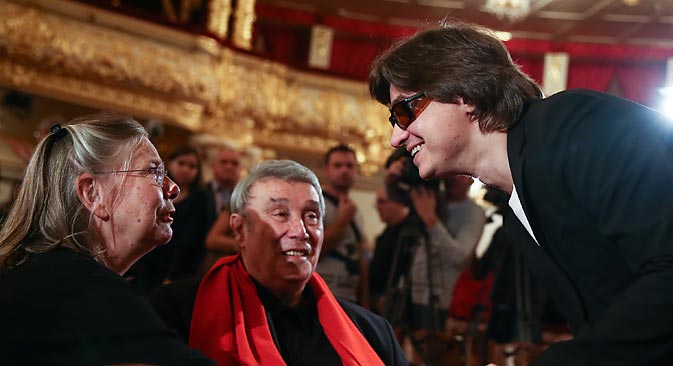
Sergei Filin returned to the Bolshoi Theatre after acid attack. Source: ITAR-TASS
Just a few years ago, Bolshoi was under public scrutiny because of its major renovation scheme, which went behind schedule and over budget and was finally completed in 2011. But the theater was hardly able to settle in on the renovated premises when troubles started.
Last January, artistic director Sergei Filin was attacked and nearly blinded when acid was thrown at his face. Recently, a court ruled that Bolshoi dancer Pavel Dmitrichenko had ordered the attack and sentenced him to six years in prison. The court also sentenced the man who executed the attack and the getaway driver.
The case brought public attention to bitter rivalries and scandals behind the scenes of the Bolshoi Ballet and split its personnel, with some defending Dmitrichenko and some siding with Filin.
Renowned dancer Nikolai Tsiskaridze, who had left the theater before the incident, made statements about a poisonous atmosphere at the theater and management’s arbitrary decisions about the assignment of lead roles.
Experts said that scandals and rivalries of that kind are not uncommon even for such high-profile theaters as Bolshoi, but they seldom get beyond the theater's walls.
"No theater exists without scandals and rivalries," Vadim Gayevsky, a theater professor at the Russian State University for the Humanities, told RBTH. "But all of that stays inside and is rarely made public. Still, as soon as a respectful conductor or choreographer joins, all the rivalries die down."
Other observers agreed that the way to handle unavoidable conflicts within a theater largely depends upon the management's skills.
American ballet dancer accuses Bolshoi of extortion
"Take the example of [St Petersburg's] Mariinsky Theater, headed by [Valery] Gergiyev," said Mikhail Agin, a professor at the Gnesin Music Academy's solo singing department. "He takes control of the situation. A lot depends on the general director. It's in his power to sort out all problems and avoid scandals."
However, there have been questions not only about the atmosphere at the theater, but also about the artistic quality of its recent productions, both ballet and opera.
"Over the last few years, the quality standards have declined," said Agin. "What the theater did to 'Yevgney Onegin' and 'Ruslan and Ludmila' wasn't good. They were completely turned upside down. [Vasily] Barkhatov could be a good director, but what he did to 'Yevgeni Onegin' is unacceptable."
Some observers say that the former general director, Anatoly Iksanov, may be the one to blame for the deterioration of the situation at the theater. According to Agin, it is difficult to say to what extent Iksanov could be responsible, but still, controversies and scandals began when he was at the helm.
Iksanov's 13-year tenure at Bolshoi coincided with the controversy over the reconstruction project, which took three years longer than expected. The recontrstuction’s costs skyrocketed 16 times from original estimates to $1.8 billion.
So last summer's decision by culture minister Vladimir Medinsky to replace Iksanov with Vladimir Urin came as a natural move.
"The arrival of Urin is hopefully going to improve the situation," Agin said. "But he will have to sort out problems that had snowballed under his predecessor."
Certainly, the job is likely to be quite difficult for Urin, even though he has a huge experience in the field of theater management, having run the Stanislavsky and Nemirovich-Danchenko Moscow Academic Music Theater for nearly 20 years.
One of the challenges he is likely to face is attracting top-notch musicians, singers and conductors to the theater, whose reputation lately has been far from spotless.
"There are good singers elsewhere in Russia, but nothing is done to attract them to the Bolshoi,” Agin said. “It is ridiculous that someone is being invited from abroad to sing the part of Lensky. The same goes for directors."
One of the vacancies that will have to be filled is the theater's musical director, as Vasily Sinaisky resigned without explanations in early December amidst preparations for the premiere of the opera "Don Carlos."
No one would provide any comments, but some media reported that Sinaisky apparently become upset after he learned that a search for his replacement was in progress.
Now it is apparently up to Urin to make decisions that would improve the situation at the country's main theater. But it is likely to take time.
"The Bolshoi is like a big ship that is making a turn, but it isn't yet clear in which direction," said Gayevsky. "Currently, it's a period of total uncertainty."
All rights reserved by Rossiyskaya Gazeta.
Subscribe
to our newsletter!
Get the week's best stories straight to your inbox